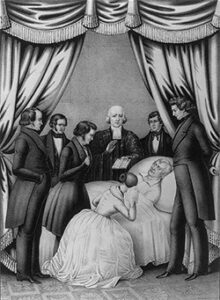 As I place nine healthy fingers– and one broken one–on the keyboard to begin writing this column, it’s Inauguration Day, 2025. Donald J. Trump will soon be sworn in as the 47th President of the United States of America.
As I place nine healthy fingers– and one broken one–on the keyboard to begin writing this column, it’s Inauguration Day, 2025. Donald J. Trump will soon be sworn in as the 47th President of the United States of America.
I won’t be watching.
There are so many things I could say and write about him, most of which have been said and written—by me and others–many times before. Today, my overriding emotion is despair. I’m saddened almost beyond words that the people of this nation have re-elected a convicted felon, a man twice impeached by the U.S. House of Representatives, and a sore loser who—on January 6, 2021—incited insurrection against the government he’d sworn on the Bible to protect and defend.
I see no reason to rehash all that. The voters have spoken and I don’t want to be crybaby. Instead, I’ll point out the irony that today is also Martin Luther King Day, when we celebrate the man who gave his life for the as yet unrealized dream of racial justice and equality. I’ll also point out that we recently celebrated the long and wonderful life of President Jimmy Carter, who was the embodiment of morality, humility, selflessness, razor-sharp intelligence, hard work and true patriotism.
Instead of comparing Mr. Trump to Dr. King or President Carter—I’ll leave that to you, dear readers–I’ll focus instead on how today’s inauguration and upcoming term of office compares to a handful of others in United States history.
You know how the Trump team moved the swearing-in ceremony indoors to the scene-of-the-crime Capitol rotunda at the last minute because of cold weather? Such a thing hasn’t been done since Ronald Reagan’s inauguration in 1981. At the time, Reagan was—at just a few days shy of age 70–the oldest person ever to become President. Obviously, 78-year-old Donald Trump has broken that record. Perhaps he suffers with what my grandmother called “low blood,” an affliction of the elderly that makes it hard to tolerate the cold.
Or perhaps Mr. Trump simply suffers from the malady known as “fear of small crowds.”
While we’re on the subject of cold weather, let’s hearken back to March 4, 1841 to William Henry Harrison’s inauguration. (Before 1933, inaugurations were held in March rather than January because communication and travel, especially in the dead of winter, were slow and difficult.) At age 68, Harrison was the oldest President-elect to take office until that time. He’d risen to fame as a rugged frontiersman and as an Indian fighter, most notably following the Battle of Tippecanoe in 1811. He maintained an aura of toughness throughout his life.
Harrison wore no overcoat, hat or gloves when he took the oath on that cold and windy day. He gave a one hour and 45 minute inaugural address and then attended several celebratory parties. He came down with a cold that quickly descended into pneumonia and died on April 4, bestowing upon him the distinction of being the President with the shortest term in office.
So perhaps Mr. Trump was remembering William Henry Harrison when he decided to move his inauguration ceremony indoors. Or perhaps not.
We know for sure that he’s heard of Grover Cleveland, the only person until now to serve non-consecutive terms as President, because he’s mentioned him a time or two. Cleveland, a Democrat, served as our 22nd President from 1885-1889 and as the 24th President from 1893-1897. Ironically, like Hillary Clinton in 2016, Cleveland won the popular vote in 1888. But he lost the electoral vote to Benjamin Harrison, who thus became the 23rd President. And get this: Benjamin Harrison just so happens to be the grandson of William Henry Harrison. For real.
When it comes to the American Presidency, it’s a small, small world.
(January 26, 2025)